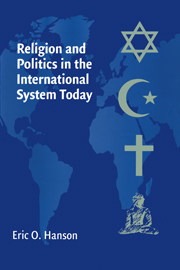Book contents
- Frontmatter
- Contents
- Acknowledgments
- Religion and Politics in the International System Today
- Introdution: The view from Silicon Valley
- I RELIGION AND POLITICS IN THE NEW GLOBAL PARADIGM
- II RELIGION IN CONTEMPORARY WORLD POLITICS
- 5 The West: Christianity, Secularization, and Immigration
- 6 East Asia: Modernization and Ideology
- 7 South and Central Asia: The Legacies of Gandhi and Khomeini and the Bomb
- 8 The Middle East and North Africa: Jewish and Islamic Politics
- 9 Latin America: Indigenous Religions, Christianity, and Globalization
- 10 Religion and Politics for the Next Millennium
- Appendix I Thirty Years of Nobel Peace Prizes, 1975–2004
- Appendix II Paradigm Chart and Category Questions
- Index
7 - South and Central Asia: The Legacies of Gandhi and Khomeini and the Bomb
Published online by Cambridge University Press: 06 January 2010
- Frontmatter
- Contents
- Acknowledgments
- Religion and Politics in the International System Today
- Introdution: The view from Silicon Valley
- I RELIGION AND POLITICS IN THE NEW GLOBAL PARADIGM
- II RELIGION IN CONTEMPORARY WORLD POLITICS
- 5 The West: Christianity, Secularization, and Immigration
- 6 East Asia: Modernization and Ideology
- 7 South and Central Asia: The Legacies of Gandhi and Khomeini and the Bomb
- 8 The Middle East and North Africa: Jewish and Islamic Politics
- 9 Latin America: Indigenous Religions, Christianity, and Globalization
- 10 Religion and Politics for the Next Millennium
- Appendix I Thirty Years of Nobel Peace Prizes, 1975–2004
- Appendix II Paradigm Chart and Category Questions
- Index
Summary
China under Deng had a decade lead over India in opening its economy to the global system. India's Prime Minister Narasimha Rao did so in 1991, following the strategy of Sikh economist Manmohan Singh, who himself became prime minister in 2004. India has thus joined China as one of the faster growing economies in the world. But India, like China, retains a great socioeconomic gap between its emerging urban middle classes and the poverty-stricken urban unemployed and rural peasantry. Many Silicon Valley residents and national campaign consultants have become very aware of India's economic progress from the outsourcing of American technology jobs to that country's Silicon Triangle and from the immigration of Indian professionals to the United States. India lags behind only Mexico in legal immigration, and the United States has more foreign students from India than from any other country.
India attained independence from Britain in 1947 under the leadership of the catch-all Congress Party. Historian Vohra states that “the party was broadly split among the village-oriented Gandhians, the Hindu Conservatives led by Sardar Patel, and Nehru's progressive left wing, all with significantly different ideologies.” The English-educated Prime Minister Jawaharlal Nehru's vision of “secularism, socialism, and democracy” won out at the party's highest levels. This secular ideology, aided by family dynastic politics, proved sufficient for the great challenge of uniting the continent's many faiths, cultures, and languages into a single nation, but it could not prevent the establishment of Pakistan or the latter rise of Hindu politics.
- Type
- Chapter
- Information
- Religion and Politics in the International System Today , pp. 198 - 227Publisher: Cambridge University PressPrint publication year: 2006



